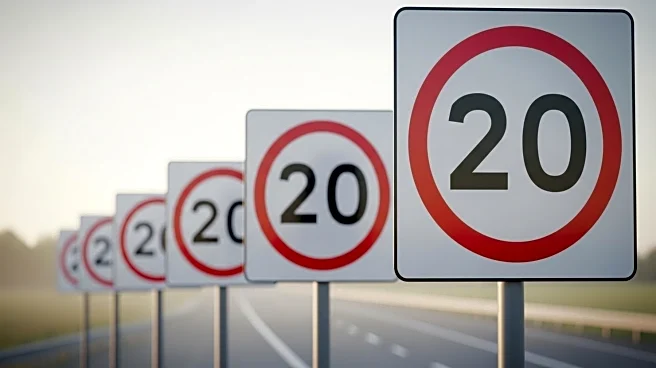What's Happening?
The Welsh government's decision to lower the default speed limit from 30mph to 20mph has resulted in nearly 900 fewer road injuries since its implementation in September 2023. This policy change, which cost £34 million, has been one of the most controversial in Wales, sparking significant public debate and the largest petition in the Senedd's history. According to the campaign group 20's Plenty, the reduction in speed limits has not only decreased the number of injuries but also prevented 14 deaths. The policy has been credited with making Welsh communities safer and reducing insurance costs for drivers. Despite these benefits, the change has faced criticism, with some, like driving instructor Stuart Walker, arguing that it has led to more dangerous driving behaviors. Walker noted that the blanket speed limit has been problematic, particularly in areas where a 30mph limit might be more appropriate.
Why It's Important?
The reduction in road injuries highlights the potential of local policy decisions to significantly impact community safety. By lowering speed limits, the Welsh government has demonstrated a commitment to reducing road casualties, which could serve as a model for other regions considering similar measures. The policy's success in decreasing insurance costs also suggests economic benefits for drivers. However, the mixed reactions underscore the challenges of implementing broad policy changes that affect diverse communities. The criticism from driving instructors and some residents indicates a need for careful consideration of local conditions when applying such policies. The debate around this policy reflects broader tensions between state-level initiatives and local control, a theme relevant to many governance issues in the U.S.
What's Next?
The Welsh government plans to continue monitoring the impact of the 20mph speed limit, with Transport Secretary Ken Skates indicating that it will take years to fully assess the policy's effects. Local authorities have been given the flexibility to review and adjust speed limits on roads where a 30mph limit might be more appropriate. This ongoing evaluation will likely involve further data collection and analysis to ensure that the policy continues to meet safety objectives while addressing public concerns. The outcome of this policy could influence similar initiatives in other regions, potentially leading to broader adoption of reduced speed limits in urban and village areas.
Beyond the Headlines
The implementation of the 20mph speed limit in Wales raises important questions about the balance between safety and practicality in road traffic management. The policy's success in reducing casualties suggests a positive shift towards prioritizing public safety over speed. However, the criticism it has faced highlights the complexities of enforcing uniform policies across varied environments. This situation underscores the importance of adaptive governance that considers local needs and conditions. The broader implications of this policy could extend to discussions on urban planning, public health, and environmental sustainability, as lower speed limits may also contribute to reduced emissions and improved air quality.











